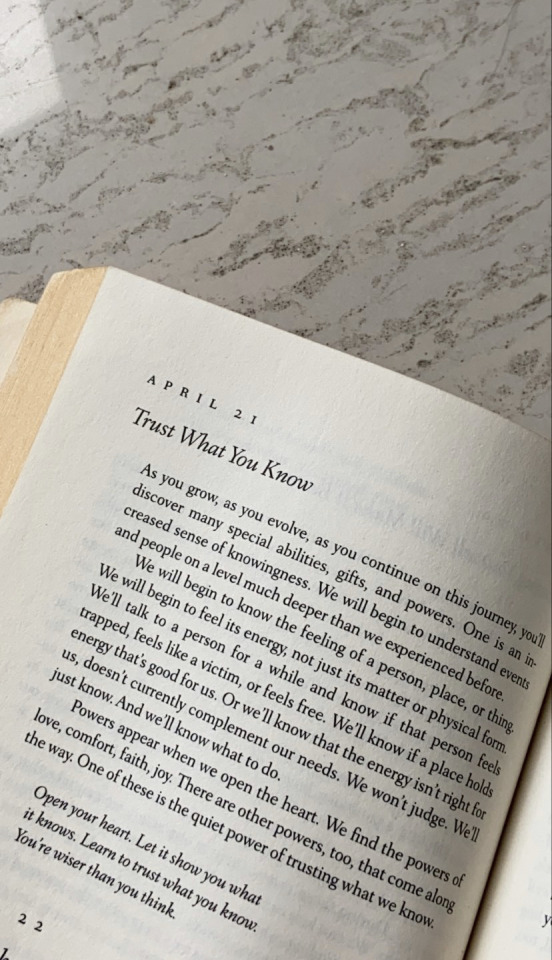Text
2021 will be a prosperous year for me, filled with spiritual goodness and soul expansion. I have faith in that. I deserve it.
11K notes
·
View notes
Text


25.04.2021
it was a really tough week, especially after a terrible economics test on friday. i’m trying to bounce back from it, though! i hope you all had a better week, at least! as a sidenote, isn't this jar of honeycomb in honey pretty?
283 notes
·
View notes
Text
ADHD tips from my school counselors:
“You need to create a study routine!”
“You need to stop fidgeting…you’re distracting yourself!”
“Get more exercise and take your meds!”
“Stop procrastinating!”
ADHD tips from my friends with ADHD:
“I eat one chocolate chip for every page I read.”
“I can only study by playing the gravity game on the Quizlet website. I need to beat my friend’s high score.”
“Every ten minutes I get up, put on one song by Taylor Swift, and wiggle around until I feel better.”
“Instead of checkboxes, I draw little flowers next to each task, and after I finished the task, I color in the flower in a fun color.”
41K notes
·
View notes
Text
How I read textbooks with ADHD:
Step 1: get a pdf of the textbook and print the chapter you need to read. Divide that fat stack of papers in sections with sticky tabs or post it notes.
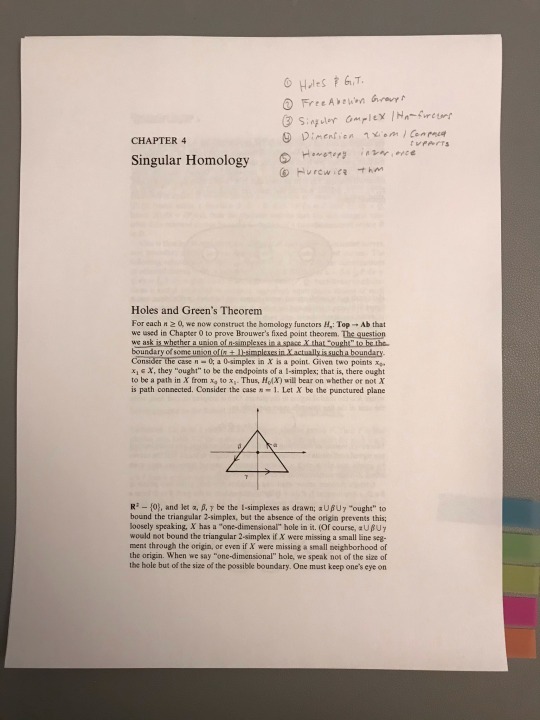
I prefer post it notes for this part because they’re easier to place and align in a uniform way because they’re bigger. Lots of people with ADHD have trouble with fine motor skills so it can be difficult to place the little tabs in a way that isn’t so chaotic it’s distracting. I couldn’t find my post it notes so I made due with tabs.
Step 2: Make a table of contents for the chapter. I need a roadmap to know where I’m going. The idea here is that we’re going to make multiple passes of the chapter in progressively more detail. This is the first pass and we’re just reading the section titles.
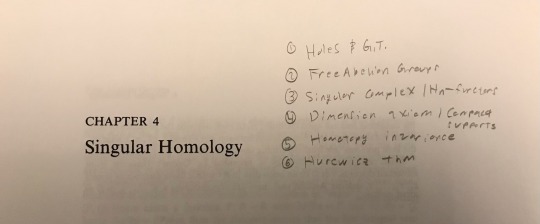
Step 3: Second pass. Read the first paragraph of each section and try to identify what the thesis statement, or motivating question for each section is.

This section wants to address the question “when is a cycle a boundary?”
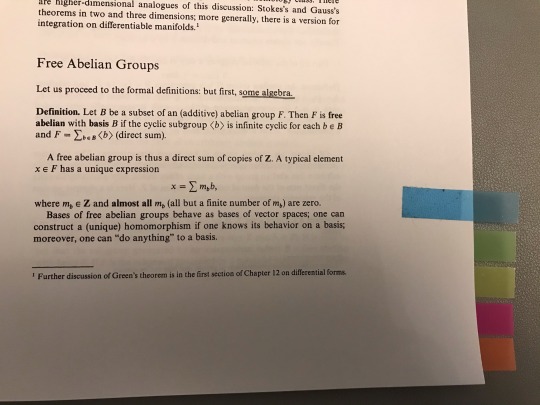
This section is a review of free abelian groups, some formalism we will need to define homology groups.
Step 4: Read each section individually. Separate the section you’re reading from the rest of the chapter so it doesn’t feel so overwhelming. One small stack for the section your on, and the rest goes off to the side.
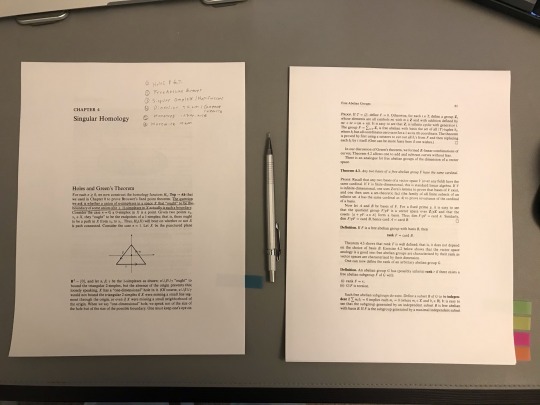
Step 4a: While you’re reading take notes in the margin. This is the best part of printing these PDFs. They’re formatted for the smaller pages of a printed book, so when you print on 8.5” x 11” you end up with these huge margins on every page.
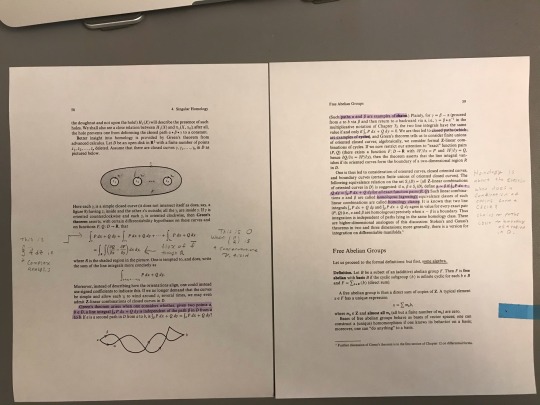
Write questions you have in the margins, or summarize the paragraph.

Pretty sure what I wrote there is wrong, but that’s ok. You can always fix it later. Learning is a refinement process, you don’t have to get it right the first time.
If you write a question, try to come back and answer it in the margin when you find the answer later.

Here’s some math specific strategies:
Everything in a math book (that isn’t “dialogue” with the author) is either a definition, a theorem/lemma/corollary, or a proof.
Definitions usually describe a structure on some category of objects. I.e. if you’re given the definition of continuity, you are describing the structure of continuity on the category of functions. Write in the margin what the category and structure are for each definition, then give a short summary of the meaning.

Theorems/etc all start with a hypothesis and finish with a result. “Given A,B, and C, then D is true” A,B,C are the hypothesis and D is the result. More complicated ones may not look like an implication: “Let A be a subset of the real numbers. A is compact if and only if A is closed and bounded”. The hypothesis is that A is a subset of real numbers, the equivalence (if and only if statement) is the result. So in the margin write explicitly what the hypothesis and result of the theorem are. Make sure you understand what things you need to check are true before you can apply a theorem.

Proofs don’t need to be memorized, but you should know the idea and strategy the proof implements well enough that you could figure it later. Take particular care around proofs that claim existence of something - they come in two forms: constructive and non-constructive. Non-constructive proofs show something exists without explicitly constructing it (like Lebesgue non-measurable sets); constructive proofs show something exists by describing the procedure to find or formula for that thing explicitly. Pay special attention to constructive proofs because the algorithm or formula they derive will probably be useful for calculations/applications.
When you finally finish that chapter hole punch it and put it in a three ring binder! After each lecture go back through your notes and either correct or add to them based on what was said in lecture.
305 notes
·
View notes
Text
Tips to study in one week or less
Exams and finals are fast approaching for many people and we’ve all been in a place where we have too much to study and too little time to do it. I am an avid procrastinator so more often than not, I let all material build up in my desk and then I stress out to go over everything before the exam! Fear no more! I have the perfect formula for you!
Stop procrastinating! Going through productivity/study tips youtube videos or studyblrs is not going to do the work for you. Stop obsessing about it, leave your phone out of your study space and organize everything you have to do.
Make a list with all the chapters/topics you have to study. That way you can have a notion of everything you should know. Once you get over them, you can cross them out and feel productive enough to keep going. Trust me, that feeling is one of the best when you are studying!
Study smart, not hard — Understand what are the most important ones and focus on those. If you have little time, there is no way you can go over every material (if it’s too much like usually happens in college/uni) and also, no professor will question everything with the same detail in the exam.
Distribute the amount of material for the amount of days you have — leave at least 2 out. It’s important to organize the material during the amount of time you have so you don’t get too lazy in one day and then stress too much over the many things you have to study on another. Evaluate well what might take longer or not and if it doesn’t work as planned, adjust your plan in the end of the study day. The last two days before the exam are important to leave free for revisions and exam preparation.
In those last 2 days, test yourself. It can be previous exams from previous years (they’re the best option), tests online, quizzes with a friend. Exams from previous years are my favourite option - professors aren’t very original so it’s highly possibly that they will repeat questions. The line of questions are also very similar and even if there aren’t many repeated, at least you already know the basis. Tests online similar to what your professors use are also a good option as well as quiz a friend and vice versa, however, this last option might take longer and not work in little time. If you work well with a study buddy, testing each other would be beneficial for both.
REVIEW ONLY what you’re less prepared for, what you did wrong in the tests, what professors ask the most. If you don’t have enough time, you don’t want to waste it reviewing what you already know. If you know, you know. Believe and trust yourself!!
Don’t stress yourself, it will be alright. Stressing over little time can be a good pressure and motivator but too much can do the opposite effect and that’s not your intention. Find a balance, use your study breaks well enough to rest and relax so you won’t be too overwhelmed in the middle of an afternoon and do nothing the rest of the day.
GET A GOOD NIGHT SLEEP THE NIGHT BEFORE. You can wake up earlier to review but make sure you have at least 7 hours of sleep that night. Sleeping well the night before the exam is essencial for your brain to process everything you’ve studied. It will also allow your brain to be fresh and ready to work by the time you take the exam. If you are too tired from an all nighter, your brain will be tired and not work as quick and efficient as you need it.
Trust yourself. It doesn’t matter the amount of time you had, you still know the material. If you believe in yourself, you’re halfway passed!! You have to remind yourself that you did the best you could with the time you had. As long as you know that, you’ll feel so much lighter and the exam will go so much better. And if it doesn’t, you won’t feel guilty because you know you gave your best. In college/university, we never know everything or get out of an exam feeling like we scored the best grade ever.
5K notes
·
View notes
Text
i miss her so much i think about her every single day (the local library)
66K notes
·
View notes
Text

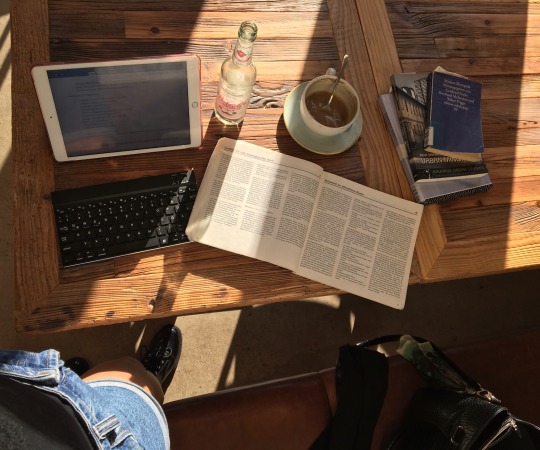
wednesday 05.08.20 // a while
It’s been a while since the last time that I sat down in a cafe to work on something for university. My job at the landscape architecture office is going great and now I only need to finish my masters thesis and then I’m finally done with university 🥳
5K notes
·
View notes
Text
“Your identity emerges out of your habits. You are not born with preset beliefs. Every belief, including those about yourself, is learned and conditioned through experience. More precisely, your habits are how you embody your identity. When you make your bed each day, you embody the identity of an organised person. When you write each day, you embody the identity of a creative person. When you train each day, you embody the identity of an athletic person. The more you repeat a behaviour, the more you reinforce the identity associated with that behaviour. In fact, the word identity was originally derived from the Latin words essentitas, which means being, and identidem, which means repeatedly. Your identify is literally your “repeated beingness.” Whatever your identity is right now, you only believe it because you have proof of it. […] The more evidence you have for a belief, the more strongly you will believe it.”
— James Clear, Atomic Habits
6K notes
·
View notes
Text


180121 / 8:41 Monday means starting from scratch, this week I’m doing that by cleaning my room before my first Zoom call
1K notes
·
View notes
Text
No one has everything together. “having it all” Is a very well constructed lie, you can do very well with your school, your health but your social life will be lacking. You could have enough family time, focus on health but your work will be lacking. You cannot devote your energy 100% into everything you do, if you think you do, you’ll find your mental health is taking a toll.
Don’t feel like your life is out of your control simply because you’re failing in one aspect of it, it’s the same for everyone. No one has it all, so focus on the things that DO MATTER and prioritise in that order, it’ll be okay. Allow yourself to be human.
2K notes
·
View notes
Text
where do you lie on the girlboss-malewife spectrum
28K notes
·
View notes
Text
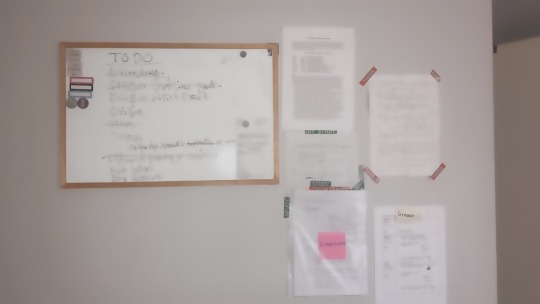
Yesterday, I had a meeting with my tutor about my dissertation. I was so scared it would go badly that I procrastinated preparing for it. Somehow it didn’t go all that bad! I’ll will to work on it my data analysis after Friday prayers :)
13 notes
·
View notes
Photo
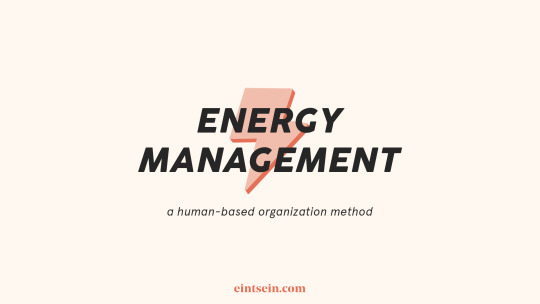
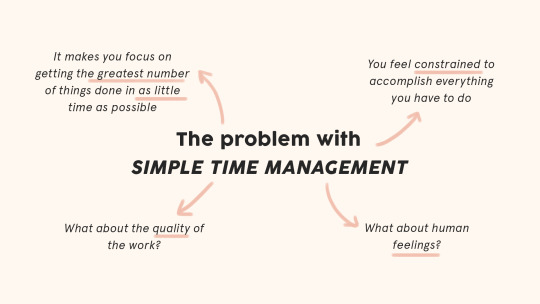
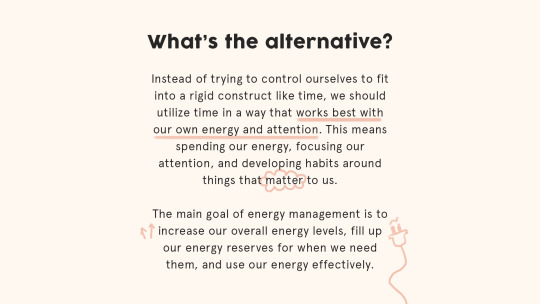
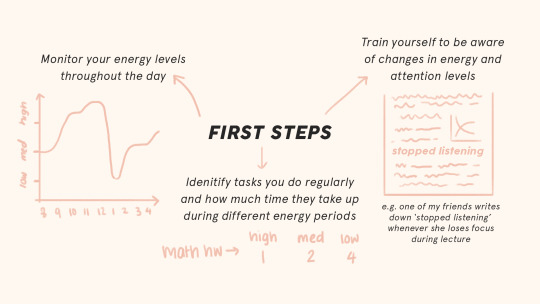

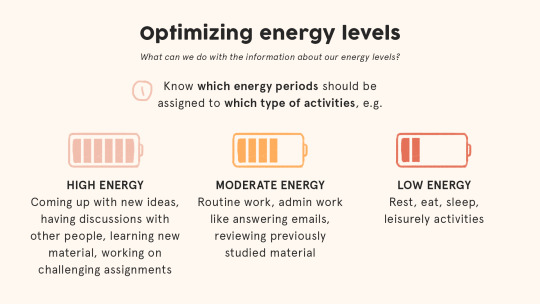
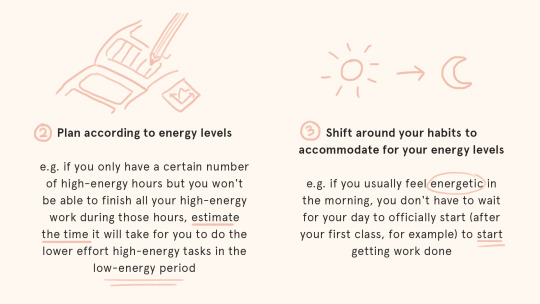
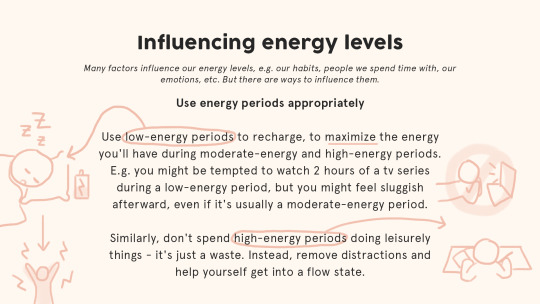
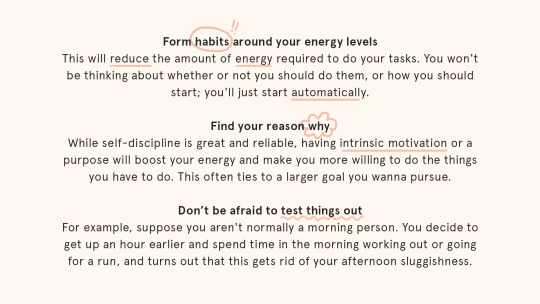
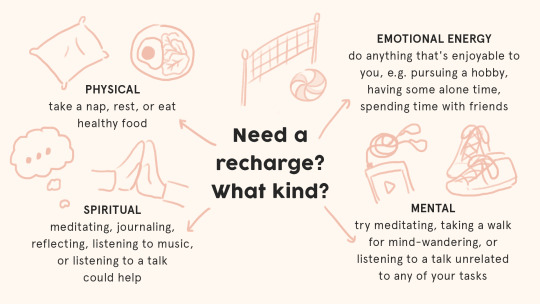
Energy Management
A human-based organization method
click on images for better resolution; images also available here (link to google drive)
Other posts that may be of interest:
Getting stuff done: How to deal with a lack of motivation
Flexible time-blocking: A more breathable way to get things done
The ABCDE Method
30K notes
·
View notes



